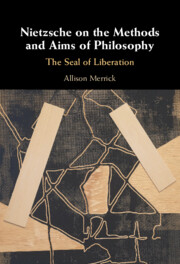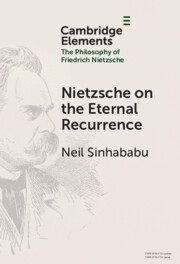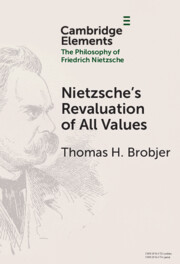Refine search
Actions for selected content:
140 results
Chapter 3 - Emerson and Skepticism
-
- Book:
- Emerson, the Philosopher of Oppositions
- Published online:
- 20 November 2025
- Print publication:
- 22 January 2026, pp 50-65
-
- Chapter
- Export citation
Chapter 5 - The Psychological Type of the Redeemer
-
- Book:
- Nietzsche on the Methods and Aims of Philosophy
- Published online:
- 25 July 2025
- Print publication:
- 14 August 2025, pp 101-121
-
- Chapter
- Export citation
Chapter 1 - The Descent of Our Moral Prejudices
-
- Book:
- Nietzsche on the Methods and Aims of Philosophy
- Published online:
- 25 July 2025
- Print publication:
- 14 August 2025, pp 14-35
-
- Chapter
- Export citation
Chapter 6 - The Seal of Liberation
-
- Book:
- Nietzsche on the Methods and Aims of Philosophy
- Published online:
- 25 July 2025
- Print publication:
- 14 August 2025, pp 122-143
-
- Chapter
- Export citation
Introduction
-
- Book:
- Nietzsche on the Methods and Aims of Philosophy
- Published online:
- 25 July 2025
- Print publication:
- 14 August 2025, pp 1-13
-
- Chapter
- Export citation
Chapter 2 - The Order of Rank
-
- Book:
- Nietzsche on the Methods and Aims of Philosophy
- Published online:
- 25 July 2025
- Print publication:
- 14 August 2025, pp 36-59
-
- Chapter
- Export citation
Chapter 7 - But How Can We Find Ourselves Again?
-
- Book:
- Nietzsche on the Methods and Aims of Philosophy
- Published online:
- 25 July 2025
- Print publication:
- 14 August 2025, pp 144-164
-
- Chapter
- Export citation

Nietzsche on the Methods and Aims of Philosophy
- The Seal of Liberation
-
- Published online:
- 25 July 2025
- Print publication:
- 14 August 2025
Conclusion
-
- Book:
- Schopenhauer's Politics
- Published online:
- 09 January 2025
- Print publication:
- 23 January 2025, pp 244-255
-
- Chapter
-
- You have access
- Open access
- HTML
- Export citation

Nietzsche on the Eternal Recurrence
-
- Published online:
- 13 December 2024
- Print publication:
- 16 January 2025
-
- Element
- Export citation
8 - Heidegger’s Mortal Phenomenology of Existential Death and the Postmetaphysical Politics of Ontological Pluralism
- from Part II - Rethinking Death after Heidegger
-
- Book:
- Rethinking Death in and after Heidegger
- Published online:
- 18 December 2024
- Print publication:
- 05 December 2024, pp 239-266
-
- Chapter
- Export citation

Nietzsche on Virtue
-
- Published online:
- 04 December 2024
- Print publication:
- 02 January 2025
-
- Element
- Export citation

Nietzsche's Revaluation of All Values
-
- Published online:
- 03 December 2024
- Print publication:
- 02 January 2025
-
- Element
- Export citation
Chapter 4 - Aesthetic Agents
-
- Book:
- Guru Nanak's Transcendent Aesthetics
- Published online:
- 21 November 2024
- Print publication:
- 21 November 2024, pp 161-204
-
- Chapter
- Export citation
3 - Nietzsche’s Centaurs
-
-
- Book:
- Nietzsche and Literary Studies
- Published online:
- 03 May 2024
- Print publication:
- 25 April 2024, pp 59-90
-
- Chapter
- Export citation
9 - Plant Imaginaries and Human Existence in Nietzsche and Sartre
-
-
- Book:
- Nietzsche and Literary Studies
- Published online:
- 03 May 2024
- Print publication:
- 25 April 2024, pp 210-229
-
- Chapter
- Export citation
5 - Genealogy as Double Agent
-
- Book:
- What Is a Classic in History?
- Published online:
- 15 February 2024
- Print publication:
- 22 February 2024, pp 258-299
-
- Chapter
- Export citation
Chapter 2 - Nietzsche’s Initial Engagement with Pessimism
- from Part I - Nietzsche’s Intellectual Context and Early Reception of Pessimism
-
- Book:
- Nietzsche's Struggle against Pessimism
- Published online:
- 02 November 2023
- Print publication:
- 16 November 2023, pp 66-98
-
- Chapter
- Export citation
Chapter 6 - An Existential Critique
- from Part III - Nietzsche’s Mature Rejection of the ‘Pessimism of Sensibility’
-
- Book:
- Nietzsche's Struggle against Pessimism
- Published online:
- 02 November 2023
- Print publication:
- 16 November 2023, pp 198-226
-
- Chapter
- Export citation
Chapter 7 - A Perfectionist Critique
- from Part III - Nietzsche’s Mature Rejection of the ‘Pessimism of Sensibility’
-
- Book:
- Nietzsche's Struggle against Pessimism
- Published online:
- 02 November 2023
- Print publication:
- 16 November 2023, pp 227-259
-
- Chapter
- Export citation
